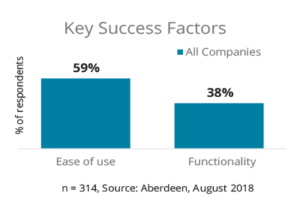It always surprises me when I visit a shop floor for the first time and realize that some of our nation’s manufacturers are still trying to compete in the 20th century. They might be making great products. They might even make them on time with minimum defects. But the fact remains that somewhere else in the world, somebody is tooling up to make the same great products, but in an up-to-date, fully-integrated, automated and paperless environment that blows older manufacturing methods right out of the proverbial duck pond.
Month: September 2018
The Digital Supply Chain Part 4: Choosing a Technology Partner for the Digital Age
Smart factories of the future driven by robots, computers and AI, are no longer the stuff of science fiction. We currently exist in the overlap of Industry 4.0 and the Digital Ecosystem and with it brings technologies and strategies that are fast changing how we conduct business – from day-to-day operations to high-level decision making.
What do Pizza and ERP have in Common?
The idea behind Aristotle’s philosophy that the whole is greater than the sum of its parts has always baffled me. If I have an 8-slice pizza and I add up all the slices, I still have one pizza, so how can one pizza be greater than its 8 slices?
The Digital Supply Chain Part 3: 5 Steps to Positioning for Optimization
“What a business needs most for its decisions – especially strategic ones, is data about what goes on outside it. Only outside a business are there results, opportunities and threats.”
— Peter Drucker
The pressures of cost, competition and a more demanding consumer continue to drive the digital transformation of industries. It pays to know how best to invest in the right technology for your sector and business type. While benchmarking exercises have long been essential to business success, digitalization requires that companies remain particularly vigilant, lest they find themselves on the wrong side of a digital divide. Positioning an organization in an era of complexity can create differentiated advantages.
Why People Participation is Crucial for Technological Change
Time and again we have seen the same story play out in sci-fi movies: the robots rise up, and then the humans defeat them. But it’s not just on the silver screen that people combat technology. It’s happening, albeit on a more subtle scale, up and down the country in businesses right now. People are fiercely resisting new technologies that will shake them out of their comfort zones.
SYSPRO Gets It Right on Avanti with Ease of Use
I recently attended the SYSPRO analyst update to hear about their new developments and continued evolution. SYSPRO has a strong presence in the manufacturing space as an ERP provider with a loyal client base.
SYSPRO prides themselves on their service and working with companies to let them operate their “own way”.
They presented survey data based on new ERP users and Millennials that reflected an impressive 76% endorsement of the point that:
“They will increasingly demand, or be drawn to vendors that let them do business their way.”
As part of the technology update, one area that SYSPRO devoted significant design effort was on their new Web-Based user interface Avanti – to support digital transformation. They spent considerable time in their design efforts and many focus groups to get exactly the right blend of functionality and ease-of-use in their solution.
The type of feedback they received gave them high marks for getting it right!

“SYSPRO Avanti is uncomplicated and requires minimum
effort to navigate”. Coricraft
“SYSPRO Avanti allows the user to navigate seamlessly
between the various panes. The layout is simple, clean
and uncluttered”. CBH
“SYSPRO Avanti offered user-friendly, familiar
experience. It’s easy to find what I am looking for and
getting to know the system in very little learning time”.
Zemco Group (PTY) LTD
Aberdeen research agrees and supports the focus on ease-of-use, along with functionality as being the top two success factors from a solution perspective on having a successful implementation.

The Digital Supply Chain Part 2: The Rise of Industry 4.0
The first industrial revolution in the late 18th century brought with it mechanisation and steam power. Mass production, assembly lines and electricity followed with the second a century later. Almost another century hence, computers and automation hailed the third. We had witnessed the proliferation of scientific management systems and with it brought the rise of efficiency driven attributes.







